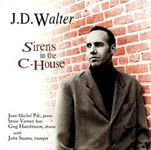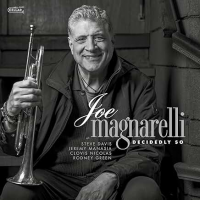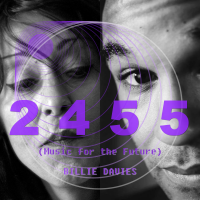Home » Jazz Articles » Album Review » J.D. Walter: Sirens In The C-House
J.D. Walter: Sirens In The C-House
Nay, ten stars! A hundred stars! Turn out the stars! Yowza!
"Sirens In The C-House" reveals the folly of trying to rate music, making it a kind of competition and blessing a reviewer's favorites with the "ultimate" rating, whatever that may be. "Sirens In The C-House" is absolutely, from track one to track nine, a stunner.
I know. I know. It's not cool for reviewers to fall all over themselves in praise of a CD. But if a reviewer can't get excited about the music, what good is a reviewer? Answer me that.
And while you're at it, answer me if you've ever heard of J.D. Walter. A show of hands. Just as I thought.
Almost without exception, brilliant regional jazz talent falls beneath the radar screen of the national and international audiences. I cringe when I read, as I did once again last week in a national jazz publication, that a musician helpfully advised another to "move to New York if you want to be successful." Why is that so? Why can't regional talent thrive financially and critically, just as it can artistically?
I mean, Kurt Elling was a Chicago phenomenon until Bruce Lundvall of Blue Note read a Chicago Tribute article about him, and then, voila! The world knows about Kurt Elling.
Well, J.D. Walter inevitably will be compared to Kurt Elling. But in spite of the fact that they lead killer rhythm sections, Pilc/Varner/Hutchinson head to head with Hobgood/Amster/Wertico, and the fact that they're white male scat singers, their styles are considerably different. Walter doesn't indulge in the poetry or beat generation sensibilities, but rather uses his voice as just another instrument in the ensemble, much as Betty Carter or Anita O'Day did. With his smoky sound, Walter wavers tones ever so slightly, comes in when he damned well feels like it to stretch the confines of a song, growls, moans, exclaims and jabs with uncanny pitch and right-on articulation.
You don't believe me? Just listen to what he does in just the first chorus of "My Ideal." As Pilc establishes the key with his lead-in chords, Walter comes in when least expected, after two-and-a-half beats, as if an afterthought, and then changes the mood to one of urgency as he poses his question, "Will I ever find...?" Pause. Billowy cushions around the words "the girl" as he identifies her as the center of the thought and as he anticipates the beat for effect. "In my mind" involves Walter's ever-so-slight bending of the pitch on the word "mind" in a Betty Carter-ish mode as he smoothes the way to his resolution of conception with the words "my ideal," faking the listener with an unexpected choice of note—that note being the same one on "my." And then he asserts a seeming inspiration with "yeah," as if he had actually just considered his "ideal" to be a "dream." Since all of this takes place in sixteen bars, that first chorus sets up a flight of distinctive scatting. Not like Elling. Not like Hendricks. Not like Tormé. Not like Salinger. (I'm just checking to see if you're paying attention.)
J.D. Walter didn't pack all of his energy and talent into only "My Ideal." Every track is like that, including a dramatic reworking of Stevie Wonder's "Golden Lady" that sounds nothing at all like Wonder or Walter's spirited charge on "The Song Is You." How does he sing like that? Breath control? Energy control? All kinds of control, giving the impression that he has lost control in his euphoria of song?
Perhaps the most reverential of the tunes is Bill Evans' "Turn Out The Stars," a gem of a performance on which Walter and Pilc cool down, Pilc going horizontal in his phrasing and semi-classical in his interpretation of song and Walter realizing in a wordless vocal way, perhaps as Milton Nascimento does, the potential of the human voice for gripping the heart.
John Swana's melodic quality on trumpet and flugelhorn becomes an appropriate counterpart to Walter's voice on several of the tunes.
Thanks be to Jim Miller's Encounter Records for bringing talents like these to the attention of listeners beyond Walter's eastern-Pennsylvania live performance schedule. In spite of the typically small marketing budgets that small labels face, let's hope that the word gets out about J.D. Walter's exceptional CD.
Track Listing
Golden Lady; You Always Hurt The One You Love; The Song Is You; Beautiful Moons Ago; My Ideal; Sirens In The C-House; Turn Out The Stars; Almost Like Being In Love; It Never Entered My Mind.
Personnel
JD Walter
vocalsJ.D. Walter: vocals; Jean-Michel Pilc: piano; Steve Varner: bass; Greg Hutchinson: drums; John Swana: trumpet, flugelhorn.
Album information
Title: Sirens In The C-House | Year Released: 2000 | Record Label: Encounter
Tags
PREVIOUS / NEXT
Support All About Jazz
 All About Jazz has been a pillar of jazz since 1995, championing it as an art form and, more importantly, supporting the musicians who make it. Our enduring commitment has made "AAJ" one of the most culturally important websites of its kind, read by hundreds of thousands of fans, musicians and industry figures every month.
All About Jazz has been a pillar of jazz since 1995, championing it as an art form and, more importantly, supporting the musicians who make it. Our enduring commitment has made "AAJ" one of the most culturally important websites of its kind, read by hundreds of thousands of fans, musicians and industry figures every month.
























